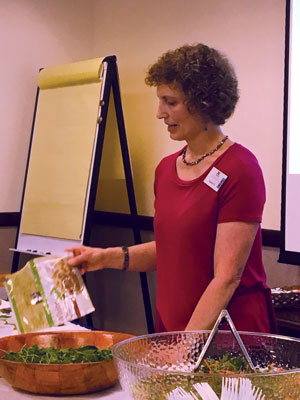
The Leever Cancer Center is fortunate to have nutrition expert Karen Sabbath, MS, RD, CSO, as part of our care team. Many patients work with Karen individually to assess their changing nutritional needs after a cancer diagnosis. Karen also offers nutrition workshops as part of our Building Your Self-Care Toolbox series.
During her recent workshop, “Eating Well for the Health of It: Maximizing Lifestyle Changes Before, During, and After Cancer”, Karen explained that, along with regular exercise of 150 minutes per week, being as lean as possible (without becoming underweight) is one of the most important ways to lower your risk of developing cancer.
Here are some busted nutrition myths and healthy-eating tips from Karen:
- Organic produce is grown without pesticides but studies have shown no significant nutritional differences between organic and conventional produce. Remember, conventional produce is better than no produce at all!
- While it is true that the average person needs seven to eight cups of fluid each day to stay hydrated, it is also true that any type or source of fluid—including fluids in the foods you eat (fruits, vegetables, oatmeal, rice, soup, just to name a few)—count! Cucumbers, watermelon, pineapple, grapefruit, blueberries, melons, tomatoes, celery, and lettuce all help with hydration. And yes, coffee counts, too.
- Yes, drinking some alcohol may be good for your heart. BUT too much of a good thing can be a bad thing. Women who consume more alcohol have a higher incidence of breast cancer, since alcohol raises estrogen levels. Women should stick to no more than one drink per day; men should stick to one or two.
- It is a myth that sugar makes cancer grow faster; however, too much added sugar adds empty calories and can increase inflammation in the body, thereby increasing the risk of chronic disease.
- There is no substitute for good nutrition, not even vitamins and supplements! Unless your doctor recommends otherwise, stick to real foods and a healthy diet. What is a healthy diet? Five to nine servings of fruits and vegetables; whole grains and legumes; limited amounts (once a week or less) of red or processed meat; limited amounts of sugar and salt.
